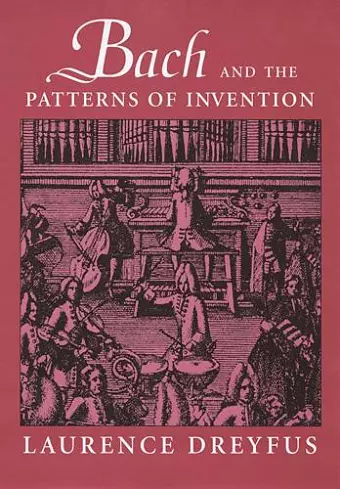Bach and the Patterns of Invention
Format:Paperback
Publisher:Harvard University Press
Published:31st Mar '04
Should be back in stock very soon

In this major new interpretation of the music of J. S. Bach, we gain a striking picture of the composer as a unique critic of his age. By reading Bach’s music “against the grain” of contemporaries such as Vivaldi and Telemann, Laurence Dreyfus explains how Bach’s approach to musical invention in a variety of genres posed a fundamental challenge to Baroque aesthetics.
“Invention”—the word Bach and his contemporaries used for the musical idea that is behind or that generates a composition—emerges as an invaluable key in Dreyfus’s analysis. Looking at important pieces in a range of genres, including concertos, sonatas, fugues, and vocal works, he focuses on the fascinating construction of the invention, the core musical subject, and then shows how Bach disposes, elaborates, and decorates it in structuring his composition. Bach and the Patterns of Invention brings us fresh understanding of Bach’s working methods, and how they differed from those of the other leading composers of his day. We also learn here about Bach’s unusual appropriations of French and Italian styles—and about the elevation of various genres far above their conventional status.
Challenging the restrictive lenses commonly encountered in both historical musicology and theoretical analysis, Dreyfus provocatively suggests an approach to Bach that understands him as an eighteenth-century thinker and at the same time as a composer whose music continues to speak to us today.
Laurence Dreyfus’s Bach and Patterns of Invention…is the first study in some time to deal above all with the reasons that music lovers ought to listen to him or play him. Dreyfus’s writing is clear and entertaining…and the advantage of [his] approach to Bach is that it makes us listen to his work as he himself listened to the music of his contemporaries, and as they would have listened to his. It does not claim to read the composer’s mind, but it reconstructs some of the processes through which he had to go to compose in each case, and it does so by referring to aural experience, leaving questions of ideology and doctrine temporarily on the side. -- Charles Rosen * New York Review of Books *
Johann Sebastian Bach is not the easiest of composers to write about, for his music can often seem so perfect that it renders description irrelevant. But Bach and the Patterns of Invention, by Laurence Dreyfus, a…totally absorbing study of Bach’s processes of composition, is written with a clarity appropriate to a discussion of his music and with an enthusiasm that immediately communicates itself. -- Charles Osborne * Daily Telegraph *
An original and detailed appraisal of Bach’s achievement… Much of this book is concerned with detailed analysis that tries to illuminate, and at least to some extent to recreate, Bach’s processes of composition. The result is the uncovering of processes that appear somewhat messy but are convincingly real. This is a fundamentally imaginative approach to analysis, involving as it does speculations about the order in which the inventions of the piece were composed and the role of procedures that were started by the composer but destined for only partial success due to the grammar of tonal music… Dreyfus’s ideas should be of interest to anyone interested in exploring new ways of understanding 18th-century music. -- Barry Mitchell * Times Higher Education Supplement *
Dreyfus’s new analytical study of Bach’s processes of composition…challenges received ideas about what constitutes a style, a form and a genre in Bach’s music, showing how the composer’s individuality stems largely from his writing ’against the grain’. Dreyfus’s book is not always easy, and neither is Bach’s music, but few readers—even the more general—of the former will be left without a better understanding of the latter. -- Malcolm Boyd * BBC Music Magazine *
[Bach and Patterns of Invention] stands head and shoulders above anything else in the field of post-war Bach criticism… Dreyfus believes that the human side of the compositional process is what must interest us about Bach, the sense of an intelligence adhering strictly to the rules he considered God-given, while freely abusing those that his contemporaries held dear. In this way we might attain a sense of the very historical nature of Bach’s music—not merely the generic and formal similarities within the idioms of his age (often the principal object of modern scholarship), but particularly the way in which the composer went against the grain of his age. -- John Butt * Early Music *
Dreyfus is concerned with how Bach thought in music, but from that deduces some idea of how he thought about music. A stimulating book. * Early Music Review *
This brilliant book sets out to answer one of the enduring mysteries of music, namely, what was the compositional method that allowed Bach to write such a vast quantity of music of such surpassing quality?… It’s a moving and convincing picture of Bach, and a thoroughly original one, delivered in lucid prose in which close argumentation is often capped by an illuminating metaphor. Like Bach’s music, it is rhetorical in the best sense. -- Ivan Hewett * Music Times *
ISBN: 9780674013568
Dimensions: unknown
Weight: 508g
288 pages